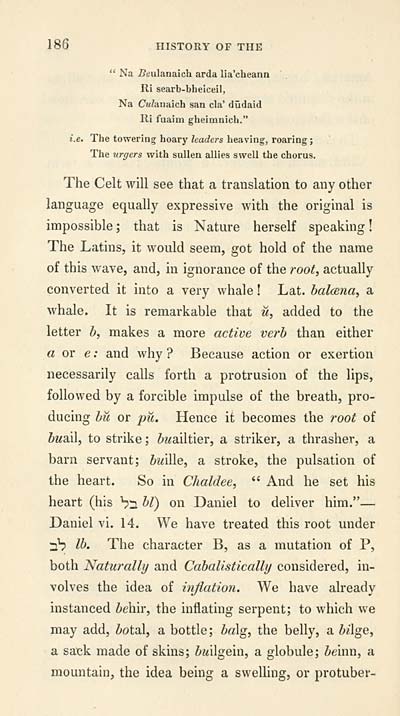Download files
Complete book:
Individual page:
Thumbnail gallery: Grid view | List view

186 HISTORY OF THE
" Na i?iiulanaich arda lia'cheann
Ri searb-bheiceil,
Na CwZanaich san cla' dudaid
Ri fuaim gheimnich."
i.e. The towering hoary leaders heaving, roaring ;
The itrgers with sullen allies swell the chorus.
The Celt will see that a translation to any other
language equally expressive with the original is
impossible; that is Nature herself speaking!
The Latins, it would seem, got hold of the name
of this wave, and, in ignorance of the root, actually
converted it into a very whale ! Lat. balcena, a
whale. It is remarkable that u, added to the
letter b, makes a more active verb than either
a or e: and why ? Because action or exertion
necessarily calls forth a protrusion of the lips,
followed by a forcible impulse of the breath, pro-
ducing bii or j)U' Hence it becomes the root of
ftwail, to strike; ^wailtier, a striker, a thrasher, a
barn servant; buiMe, a stroke, the pulsation of
the heart. So in Chaldee, " And he set his
heart (his bn W) on Daniel to deliver him." —
Daniel vi. 14. We have treated this root under
nb lb. The character B, as a mutation of P,
both Naturally and Cahalistically considered, in-
volves the idea of inflation. We have already
instanced iehir, the inflating serpent; to which we
may add, Z*otal, a bottle; 6«lg, the belly, a Z*/lge,
a satk made of skins; Swilgein, a globule; Z>einn, a
mountain, the idea being a swelling, or protuber-
" Na i?iiulanaich arda lia'cheann
Ri searb-bheiceil,
Na CwZanaich san cla' dudaid
Ri fuaim gheimnich."
i.e. The towering hoary leaders heaving, roaring ;
The itrgers with sullen allies swell the chorus.
The Celt will see that a translation to any other
language equally expressive with the original is
impossible; that is Nature herself speaking!
The Latins, it would seem, got hold of the name
of this wave, and, in ignorance of the root, actually
converted it into a very whale ! Lat. balcena, a
whale. It is remarkable that u, added to the
letter b, makes a more active verb than either
a or e: and why ? Because action or exertion
necessarily calls forth a protrusion of the lips,
followed by a forcible impulse of the breath, pro-
ducing bii or j)U' Hence it becomes the root of
ftwail, to strike; ^wailtier, a striker, a thrasher, a
barn servant; buiMe, a stroke, the pulsation of
the heart. So in Chaldee, " And he set his
heart (his bn W) on Daniel to deliver him." —
Daniel vi. 14. We have treated this root under
nb lb. The character B, as a mutation of P,
both Naturally and Cahalistically considered, in-
volves the idea of inflation. We have already
instanced iehir, the inflating serpent; to which we
may add, Z*otal, a bottle; 6«lg, the belly, a Z*/lge,
a satk made of skins; Swilgein, a globule; Z>einn, a
mountain, the idea being a swelling, or protuber-
Set display mode to: Large image | Transcription
Images and transcriptions on this page, including medium image downloads, may be used under the Creative Commons Attribution 4.0 International Licence unless otherwise stated. ![]()
| Early Gaelic Book Collections > Blair Collection > History of the Celtic language > (192) |
|---|
| Permanent URL | https://digital.nls.uk/76180721 |
|---|
| Description | A selection of books from a collection of more than 500 titles, mostly on religious and literary topics. Also includes some material dealing with other Celtic languages and societies. Collection created towards the end of the 19th century by Lady Evelyn Stewart Murray. |
|---|
| Description | Selected items from five 'Special and Named Printed Collections'. Includes books in Gaelic and other Celtic languages, works about the Gaels, their languages, literature, culture and history. |
|---|

